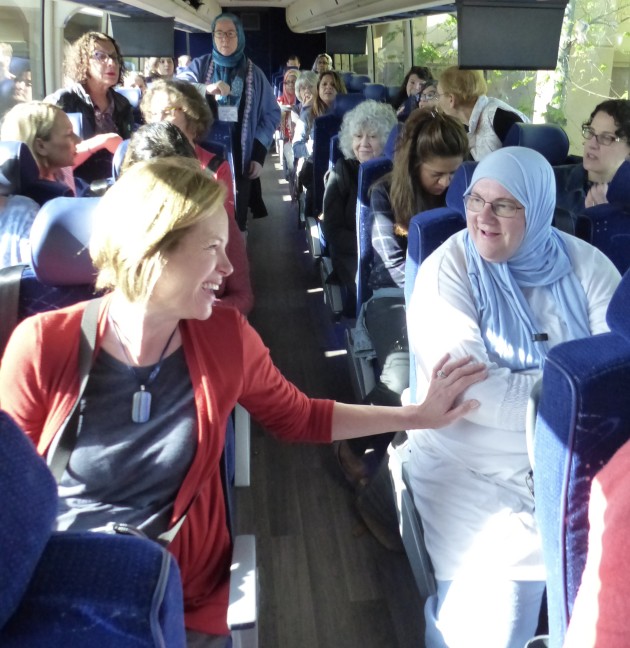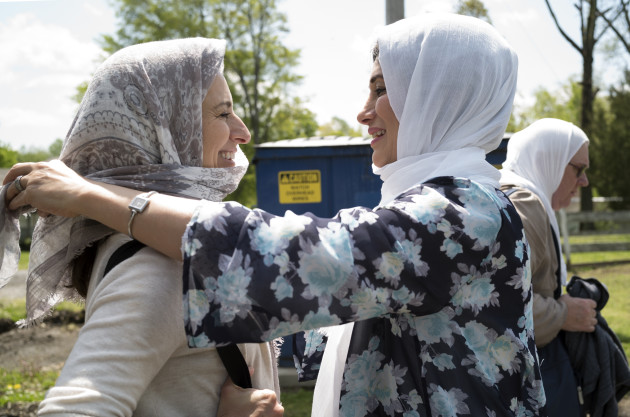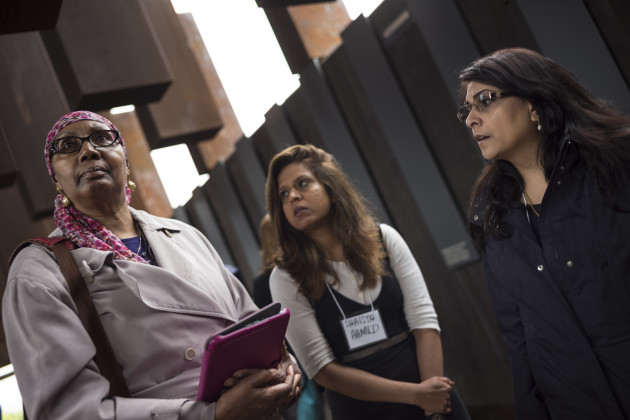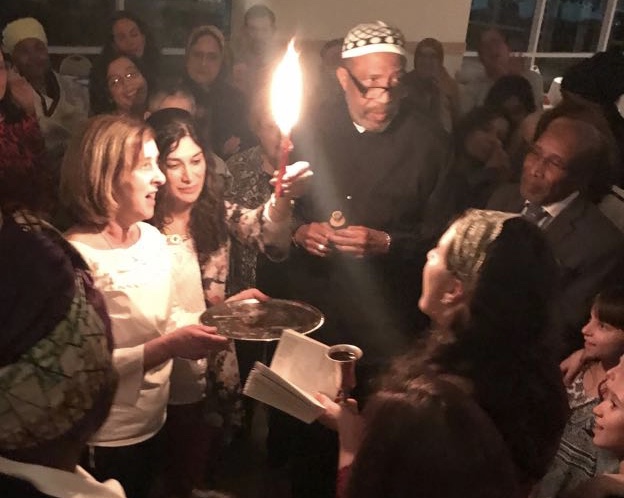
by Amy Stone
Muslim and Jewish Women on a Southern Civil Rights Road Trip

Reaching across the aisle – Cyndy Wyatt (left) and Dorene Alama discovered they
both attended the same Catholic school in upstate New York. Cyndy, now living in
Stowe, Vt., converted to Judaism. Dorene, in Charlotte, N.C., converted to Islam.
Photo: Amy Stone
Back in April, a busload of white and brown Jewish and Muslim women, some in hijab, headed south along the civil rights trail from Georgia to Alabama to Tennessee. What could go wrong?
We’re riding with Brenda, a third-generation female bus driver from Asheville, North Carolina, and Todd, our African-American civil rights expert. We’re a world away from the 1961 Freedom Riders aboard Greyhound buses attacked by violent mobs for attempting to integrate southern bus terminals. But this is also far from a Disneyland outing. We’re in the Trump era of hate with his Muslim ban and war on immigrants.
We’ve signed on for the Building Bridges Civil Rights Bus Tour created by the Sisterhood of Salaam Shalom. SOSS is a national organization committed to bringing Muslim and Jewish women together to cross the religious divide by getting to know each other and, together, stand up against racism and discrimination. Women are responding. Founded by Sheryl Olitsky and Atiya Aftab in 2013, SOSS is a grassroots organization with national guidelines. Since Trump’s election, the number of chapters has more than tripled, from 45 to 145, with some 2,500 members in the U.S. and Canada. Another 2,000 potential members are interested in joining if they can find enough local women to organize chapters.
The trip planners navigated the minefield of dietary requirements – kosher, halal, vegetarian, gluten-free and, out of respect for our Muslim sisters, no alcohol except for wine as part of Shabbat in Memphis. At our volunteer stint at Habitat for Humanity, Muslims had no trouble finding a place to pray on the grass before getting to work ripping out the innards of a house under renovation. Shabbat services were walking distance from our Memphis hotel.
Nearly 50 women on a bus together for eight days can’t stop talking. A woman from Manila tells me, “Everyone wants to know which one I am” (Jewish or Muslim). In fact, she’s a Catholic convert to Judaism, and she’s on her iPad, preparing for her next Shabbat Torah reading. A woman in hijab from a Washington suburb tells me that she benefits from white privilege even with a head covering. She’s on a spiritual trip that’s taken her from growing up Catholic in Beaumont, Texas, where the media dubbed her alma mater “the last high school in America to desegregate.” Her husband is Turkish, an observant Muslim. It took her years to convert and even longer to cover her head. She says that as president of her mosque, she’s the only woman president her imam knows of, and she once surprised a Protestant minister by telling him a woman can be a feminist and a Muslim.
Two women, one in hijab, discover they both went to the same Catholic school in a tiny upstate New York town near the Canadian border. One converted to Islam. One converted to Judaism. Their meeting on this bus is destiny.
Many of the Muslim women are first-generation Americans – born abroad or the children of immigrants. I meet a Muslim chaplain from Trinidad and Tobago with family originally from India; a pharmacist from Iran; government workers with parents who came from Pakistan; a marketing consultant whose parents came from Egypt.

Sisterly coverup—A Muslim on the SOSS bus trip helps cover the head of a Jew before attending Friday prayers at Masjid Al-Muminun in Memphis.
Photo: Joan Roth
The Jewish women on the trip are generally older than the Muslims —an Israeli-born psychologist, a retired rocket scientist, the founding executive director of the International Psychogeriatric Association, one woman who’s been fighting for civil rights since she was seven, others who want to catch up. We all feel the need to make this journey together, to experience the civil rights struggle with our Muslim and Jewish sisters. Coming from my white, mostly Jewish, Upper West Side Manhattan bubble, I feel the need to connect with others outside my circle .
We’re taking the bus from Atlanta, birthplace of Martin Luther King Jr.; to Selma, where the 1965 Bloody Sunday attacks by local and state law enforcement targeted people on the Edmund Pettus Bridge marching for black voting rights, followed by the massive march to Montgomery under federal protection; to Montgomery, for the April 26 opening of the new lynching memorial (officially the National Memorial for Peace and Justice); to Birmingham, where in 1963 Bull Connor’s police dogs and fire hoses couldn’t stop the Children’s Crusade of thousands of black children ready to go to jail for civil rights. A few months later, four little girls killed in the bombing of a Birmingham Baptist church shocked America. At the end of the road lies Memphis, where, 50 years ago this April, King was shot on the balcony of the Lorraine Motel – now part of the National Civil Rights Museum.
History delivered the trip’s biggest shocks. I was unprepared for two black and white photos at The Temple in Atlanta, the city’s first Jewish house of worship. A photo of the ruined Temple after a 1958 bombing against the rabbi’s civil rights activism and, more poignant, the photo of Leo Frank and his future bride, who were members of the congregation before he was falsely accused of murdering a teenage girl, abducted from prison and lynched.
In Selma, we white and brown women experience how easily we can be intimidated. The African-American woman who re-creates the experience of slavery for non-blacks shocks us even in the comfort of a riverside art gallery. A Jewish woman from near Chicago tells me that hearing about the Africans forced down to the riverside slave ships made her think of Jews being forced into box cars.
It’s the surprises that raise consciousness. Yes, there was a passionate woman rabbi at the opening of the National Lynching Memorial in Montgomery. But without my Muslim sisters present to point it out, I never would have realized that there was no Muslim speaker of faith on the program.

Sisterly support—(From left) Miniimah Bilal-Shakir with Shaista Ahmed and Nazli Chaudry at opening of the National Lynching Memorial in Montgomery.
Photo: Joan Roth
Under the giant hanging markers listing the thousands of black Americans lynched, Muslims and Jews tried to comfort Miniimah, the sole African-American woman in our group. Raised Christian, she embraced Islam 45 years ago. Seeking out the marker for her husband’s home county, Washington County, Georgia, she was relieved to find that neither of the two names etched in the rusting steel was family. But, she says, “When I looked at Fulton County, which I believe is the Atlanta area, I was so shocked at the number of names that I was almost brought to tears. There were too many to count. During this trip my African ancestors made sure that I felt them. I had so many sisters who wanted to help me. I felt that they really couldn’t. This was something that I had to deal with alone.”
Days of walking in the steps of civil rights history; bombarded by images of that history – in the civil rights museums, in the bus videos, on the gift shop postcards; sitting next to the statue of Rosa Parks sitting up front on a bus in her museum in Montgomery; hearing from African-American women who helped shape that history. Late night programming and talking, talking. Early mornings back on the bus. Sleep deprivation reminiscent of the old Werner Erhard est training that breaks down your defenses. As the Israeli born woman who’s on fire over Israeli treatment of Palestinians told me, “I knew this trip would give me nightmares.” She explained, “I know my connection to the African-American pain is about my pain about my family’s history in the Holocaust, the suffering and injustice of it all. So, I knew the trip would trigger that pain.”
The trip itself went smoothly in a part of our country where the civil rights tourism industry co-exists with Confederate Memorial Day. As far as I know, no one experienced racial or religious attacks, despite the White House’s inciting hatred for immigrants and asylum seekers. We certainly didn’t keep a low profile. We poured off the bus wearing a growing number of political buttons and T-shirts. We were becoming an unrestrained female force.
Our last night in Memphis, the Havdalah celebration at the end of Shabbat welcomed four imams, their wives, and their community– a first for Memphis. Adults and kids dived into conversation. The imam from the mosque where we had participated in Friday prayer told me, “I was concentrating on what I was going to say. Then I realized this is an opportunity.” A teenage Jew and a teenage Muslim wanted to start a local SOSS teen chapter. While those present bore no pre-existing animosities, it took the bridge-building agenda of the SOSS bus trip to bring them together.

Muslims and Jews together – (Counter clockwise) Rabbi Sarit Horwitz of Beth Sholom Synagogue in Memphis holds wine glass; Imam Rashad Sharif holds spice container; Ameneh Paziresh holds braided havdalah candle; Sheryl Olitzky holds tray. The ecumenical close of Shabbat was a Memphis first. Photo: Rokeya Akhter
We remain energized, thanks in part to the text message application WhatsApp. The Israeli-Palestinian conflict may have been the one taboo subject, as SOSS discourages taking it on till we’ve known each other for at least a year. In fact, with none of the Muslims from Israel or Palestine, the “situation” was no more pressing than numerous other world crises.
But post-trip, when Israel fired on the Gazans at the border, our SOSS group on WhatsApp responded with healing messages for both Gaza and Israel.
What could go wrong? It hit after the trip – children were ripped from their asylum seeking parents at our border as the Supreme Court upheld Trump’s Muslim ban. We’re responding, united on WhatsApp for protests and direct outreach to stand up to hatred, keep the bus trip rolling.
For information on the Sisterhood of Salaam Shalom, including their upcoming annual conference in November: https://sosspeace.org/
Read Lilith’s three-reporter blog on last November’s SOSS conference
Amy Stone is a founding mother of Lilith Magazine.